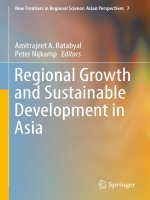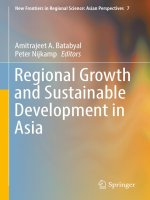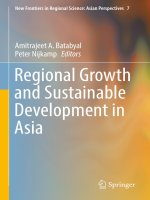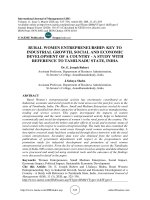Economic growth and economic development 210
Bạn đang xem bản rút gọn của tài liệu. Xem và tải ngay bản đầy đủ của tài liệu tại đây (48.61 KB, 1 trang )
Introduction to Modern Economic Growth
.
L o g G D P p e r c a p ita , P P P , in 1 9 9 5
10
AUS
NZL
USA
SGP
HKG
CAN
CHL BHS
ARG
VEN
URY
MEX
COL
CRI
BRATTO
MYS
ZAF
TUN
ECU
PER
DZA
GTM
PRY
MAR
EGY
SLV
BOL
SUR
GUY
8
PAN
DOM
JAM
IDN
AGO
LKA
HND
PAK
IND
SDN
BGD
GAB
NIC
SEN
VNM
HTI
KEN
CMR
COG
GIN
UGA
ZARBFA
NER
CIV
GHA
TGO
GMB
MDG
NGA
MLI
SLE
TZA
6
2
4
6
Log Settler Mortality
Figure 4.12. The relationship between mortality of potential European settlers and GDP per capita in 1995.
relatively poor countries can be explained by differences in their economic institutions (as proxied by security of property rights). Equally important, the evidence
indicates that once the effect of institutions is estimated via this methodology, there
appears to be no effect of geographical variables; neither latitude, nor whether or
not a country is land-locked nor the current disease environment appear to have
much effect on current economic outcomes. This evidence again suggests that institutional differences across countries are a major determinant of their economic
fortunes, while geographic differences are much less important.
These results also provide an interpretation for why Figure 4.2 showed a significant correlation between latitude and income per-capita. This is because of the
correlation between latitude and the determinants of European colonization strategies. Europeans did not have immunity to tropical diseases during the colonial
period and thus settler colonies tended, other things equal, to be created in temperate latitudes. Thus the historical creation of economic institutions was correlated
with latitude. Without considering the role of economic institutions, one would find
196
8









